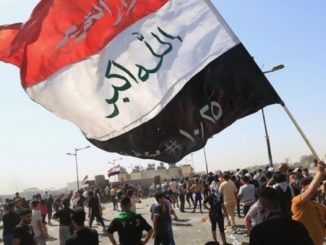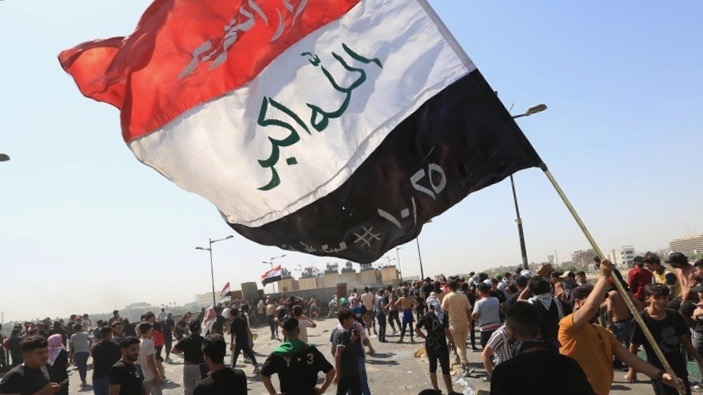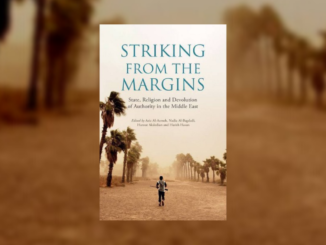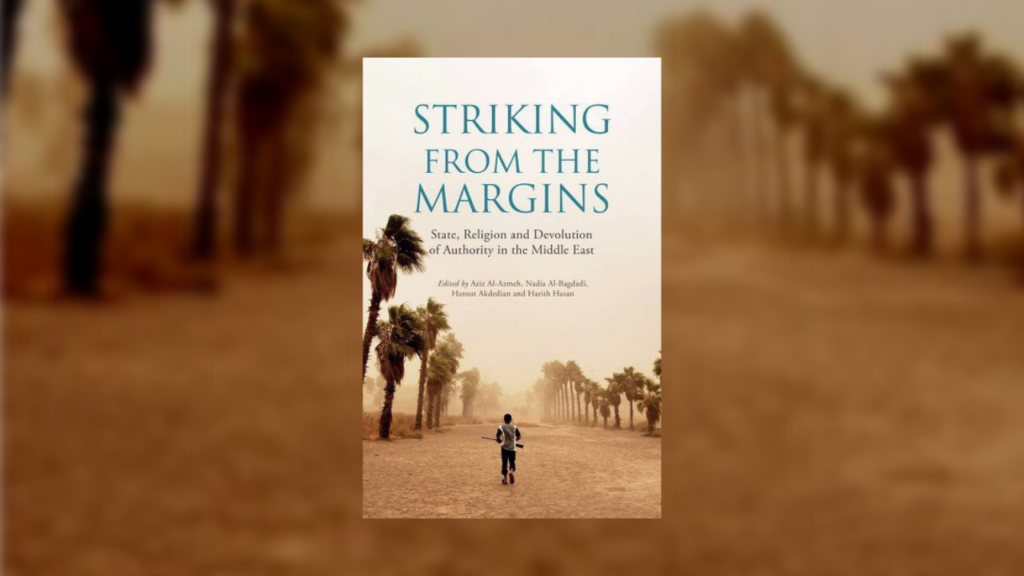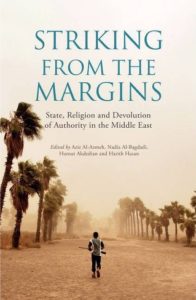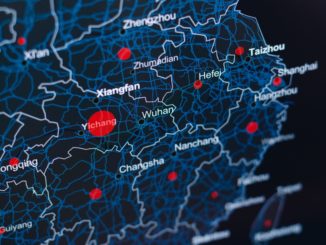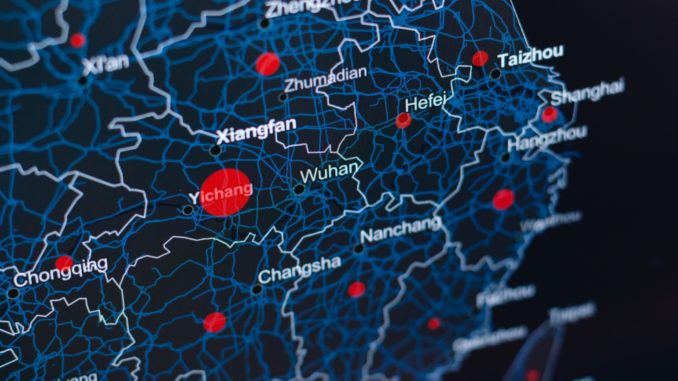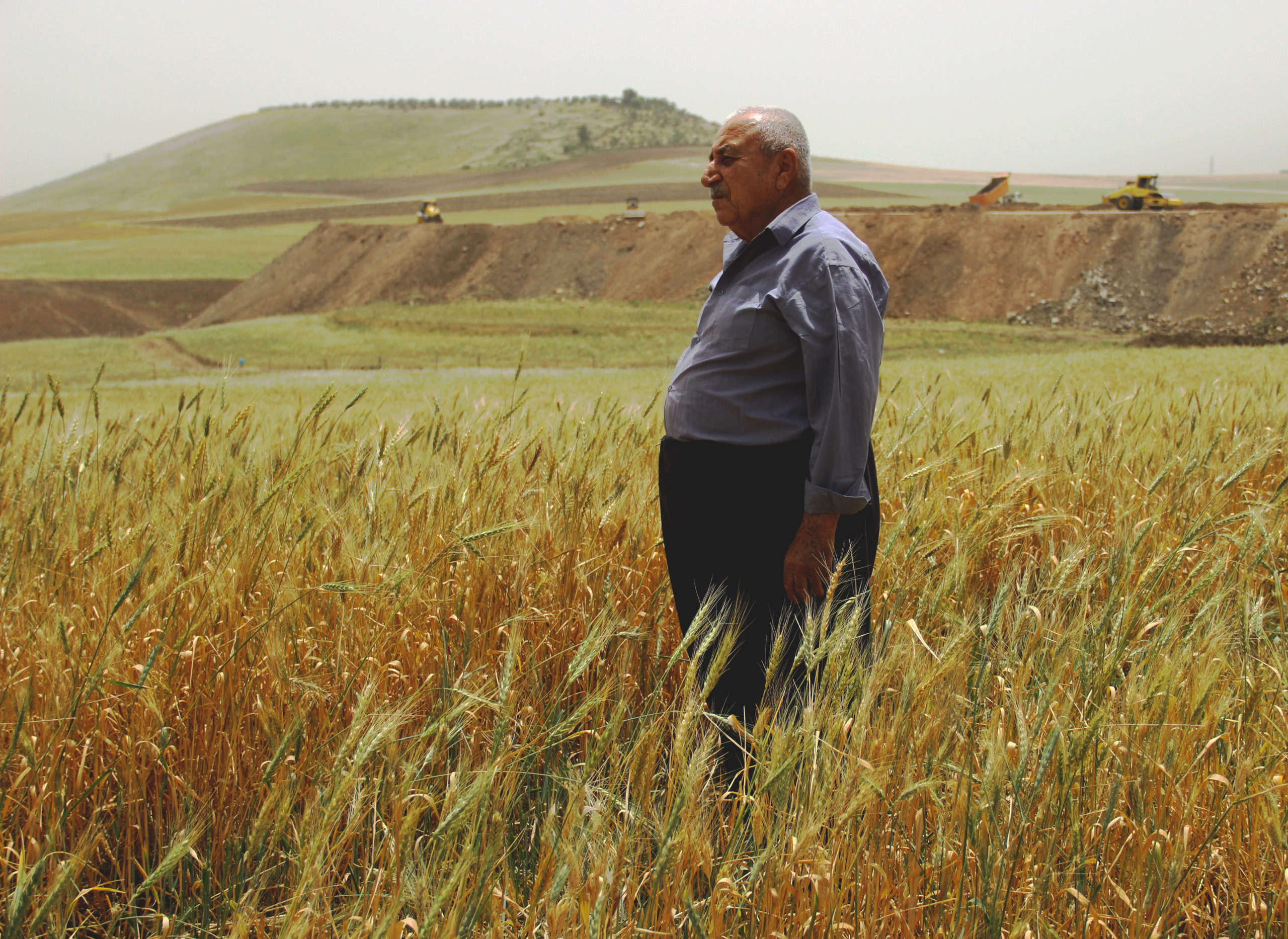
SULAYMANIYAH, Iraqi Kurdistan—Standing outside his home in Chaqlawa village, a half-hour drive from the city of Sulaymaniyah, Latif Karim Ismael, wearing black baggy trousers and a light-blue shirt, greeted us and hinted we sit in his backyard.
Accustomed to working a thriving land, the 75-year-old farm worker has to face up to a completely different reality today, with his production having dramatically dropped because of a drought.
“Ten years ago, our land produced 12 tons of wheat—now it’s six,” Karim Ismael began recounting to Toward Freedom. “Barley is half or less than what we used to harvest. Until five years ago, I was growing plenty of vegetables, like chickpeas, beans, lentils. Now, it’s just wheat and barley.”
Karim Ismael added that, besides low rainfall, the poor state of water has caused heavy losses to his yield. Untreated wastewater originating from Sulaymaniyah, the capital of the province of Sulaymaniyah in Iraq’s Kurdistan Region (KRI), has contaminated water and soil around Tanjaro River since the early 2000s.
“Back in time, I used to sell my own produce and make an income from that,” the 75-year-old sighed. “Today, the little we grow barely covers our needs.”
Living with three family members, none of whom work, he has relied on his small pension from working for 16 years as a handyman in a public school to provide for the household.
The main source of water supply for his family is groundwater from a well, collected for both agriculture and domestic use (drinking, washing, cooking and cleaning). Having witnessed harsh water shortages in the past few years, he said he would turn to the water well for irrigating his crops.
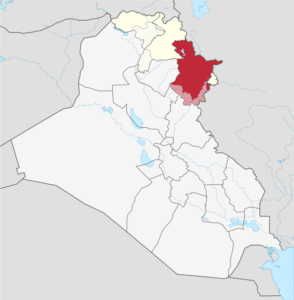
The agricultural season in KRI usually starts in early November with the first rainfall. The harvest begins in mid-May and lasts until June, extending into July in some areas.
Most Kurdish farmers have normally relied on winter rains to fill reservoirs that sustain their fields through the dry season. However, rainfall across the region has drastically dropped over the last two years.
In April, the director of Dukan dam predicted a drought in the region this year as only 300 millimeters—half of the needed precipitation—had fallen.
Fifty percent of Iraq’s farmland faces desertification. The main rivers—the Euphrates and Tigris—are expected to dry up by 2040, according to the Iraqi federal government. Meanwhile, the World Bank has predicted a 20-percent drop in drinking water by 2050. NGOs say long-standing dams in neighboring countries exacerbate the conditions. Meanwhile, the regional government recently approved four dams in Iraqi Kurdistan to combat the lack of water. All this comes as Iraq is among the five countries most vulnerable to water and food insecurity due to climate change.
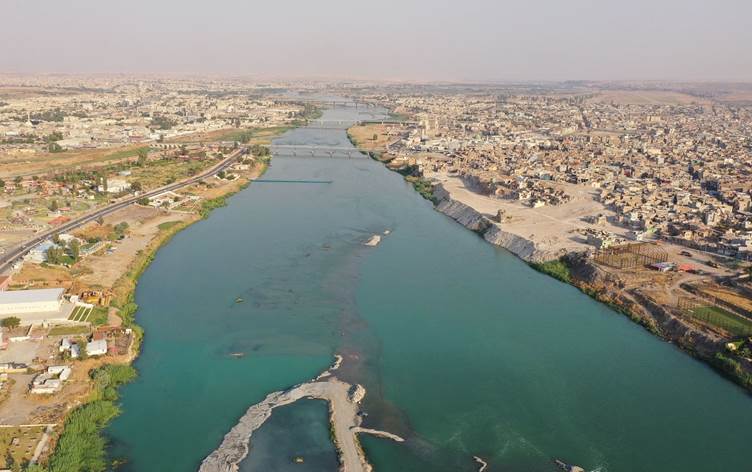
‘People Don’t Use Water Properly’
Since the start of the 2000s, local farmers have not received compensation or other types of support from the Kurdistan Regional Government (KRG) for losses suffered.
“We haven’t seen any assistance, whether financial aid, equipment or fertilizers,” Karim Ismael said. He added the KRG said its priority was first the fight against ISIS, then the budget dispute with the Iraqi federal government, and later the COVID pandemic.
The old peasant lives on his invalidity pension, having carried a war injury disability since the time he fought during the 1960s for autonomy within Iraq. Like everyone in the village, he depends on groundwater for his family’s consumption and to water the little he can produce. They have their own well and share it with four households.
Chaqlawa, which counts 50 houses and some 330 residents, is not connected to the main water pipeline from Sulaymaniyah, as is usually the case in rural areas. People help one another by sharing water wells. They strive to ensure wells do not dry up, or at least that the groundwater is sustained until the next rainy season.
Adding pressure on water resource management, villagers have not adapted to the water crisis.
“People don’t use water properly,” Shad Azad Rahim, an environmental activist from Sulaymaniyah told Toward Freedom. “There’s still no awareness of water conservation, and many farmers have not converted to modern, efficient irrigation systems.” Only two farmers use the drip irrigation method.
Rahim, who coordinates projects at Humat Dijlah and Waterkeepers Iraq-Kurdistan, two local organizations striving to protect water sources, denounced that shopkeepers and others use drinking water for routine cleaning. “Such conduct goes completely unpunished.”
The project coordinator also pointed to the lack of wastewater treatment plants in Iraq, implying sewage and industrial garbage are commonly dumped into fresh water courses. That has polluted the KRI’s two main sources for drinking water, the Dukan and Darbandikhan lakes.
“People have been demanding treatment facilities for years and years,” he said. “Yet, no action has been seen from the government’s side.”
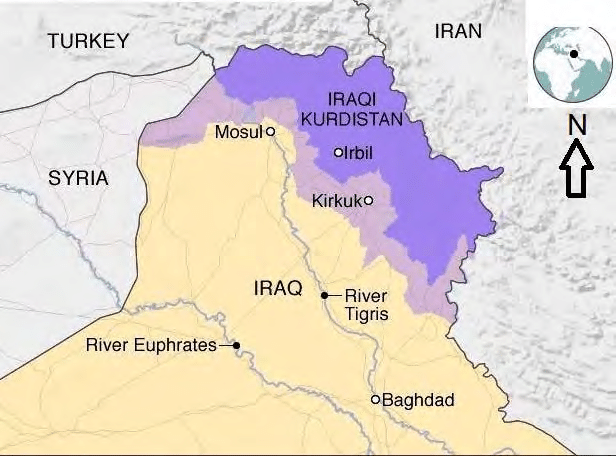
‘Tar Oil Killed My Crops’
A few hundred meters away from Karim Ismael’s house, three villagers who had gathered on a rural road made their way into a patio while inviting this reporter to follow them.
“Years back, I was planting a large amount of crops. Until the day I found them all black and dead!” Mohamed Mahmoud Ismael uttered to Toward Freedom. Donning a black-and-white turban scarf on his head, the 75-year-old pointed to an oil factory in the vicinity of farmlands. “Tar oil poured straight into Tanjaro River at night reached my arable land and killed the crops.”
Seventy percent of Iraq’s industrial waste is dumped into rivers or the sea, based on data provided by the UN and academics. The Tanjaro River, located south of Sulaymaniyah city, has been polluted by untreated wastewater for decades. It joins the Sirwan River to form the Diyala River, which is a tributary of the Tigris, the great river of Mesopotamia that together with the Euphrates gives life to all of Iraq. The direct impact on residents is twofold because they use water for drinking and farming. In partnership with Humat Dijlah, and in coordination with the Sulaymaniyah governorate’s Department of Environment, Waterkeepers Iraq-Kurdistan has organized the “Tanjaro River Threat Assessment and Outreach Project” to raise awareness about environmental threats surrounding this small river. The advocacy NGO organizes regular cleaning campaigns at lakes and rivers in the Kurdistan region.
Meanwhile, Neighboring Turkey and Iran’s dam projects have reduced water flow into Iraq. While Iraq and Syria have signed up to the UN Watercourses Convention of 1997—under which nations are obligated to equitably share their neighbors’ water resources—Turkey and Iran have not.
The spokesperson for Iraq’s water ministry said that since last year, water levels in the Euphrates and Tigris rivers had dropped by more than half.
Water activists have reported severe water scarcity in areas from Diyala governorate all the way south to Basra, complaining dams reduce the proportion of water quotas, especially in southern Iraq.
“Up until 1998, we were two big families here cultivating a large output of vegetables and living entirely on our food products. We would always have extra yield to give to other families,” Bakr Sdeeq Hussein, 54, recounted, speaking to Toward Freedom in Chaqlawa. “As water pollution and scarcity gradually hit most of my agricultural production, I decided to cultivate only wheat and few fruits (pomegranates, peaches, apples). I had planted 30 small trees last year. Sadly, all of them died.”
The villager’s subsistence today depends on his taxi business.
Save the Tigris, a civil society advocacy campaign that promotes water justice in the Mesopotamian basin, recently issued a report raising the alarm on the rising volumes of water lost due to evaporation from Iraq’s dam reservoirs.
Rahim argued food production in the Kurdish region is facing a crisis as a result of low precipitation and declining river levels from upstream countries. “Desertification is threatening 70 percent of the country’s agricultural lands,” he said, citing an Iraqi health and environment ministry report. Rahim added that would soon make it “impossible to grow anything.”
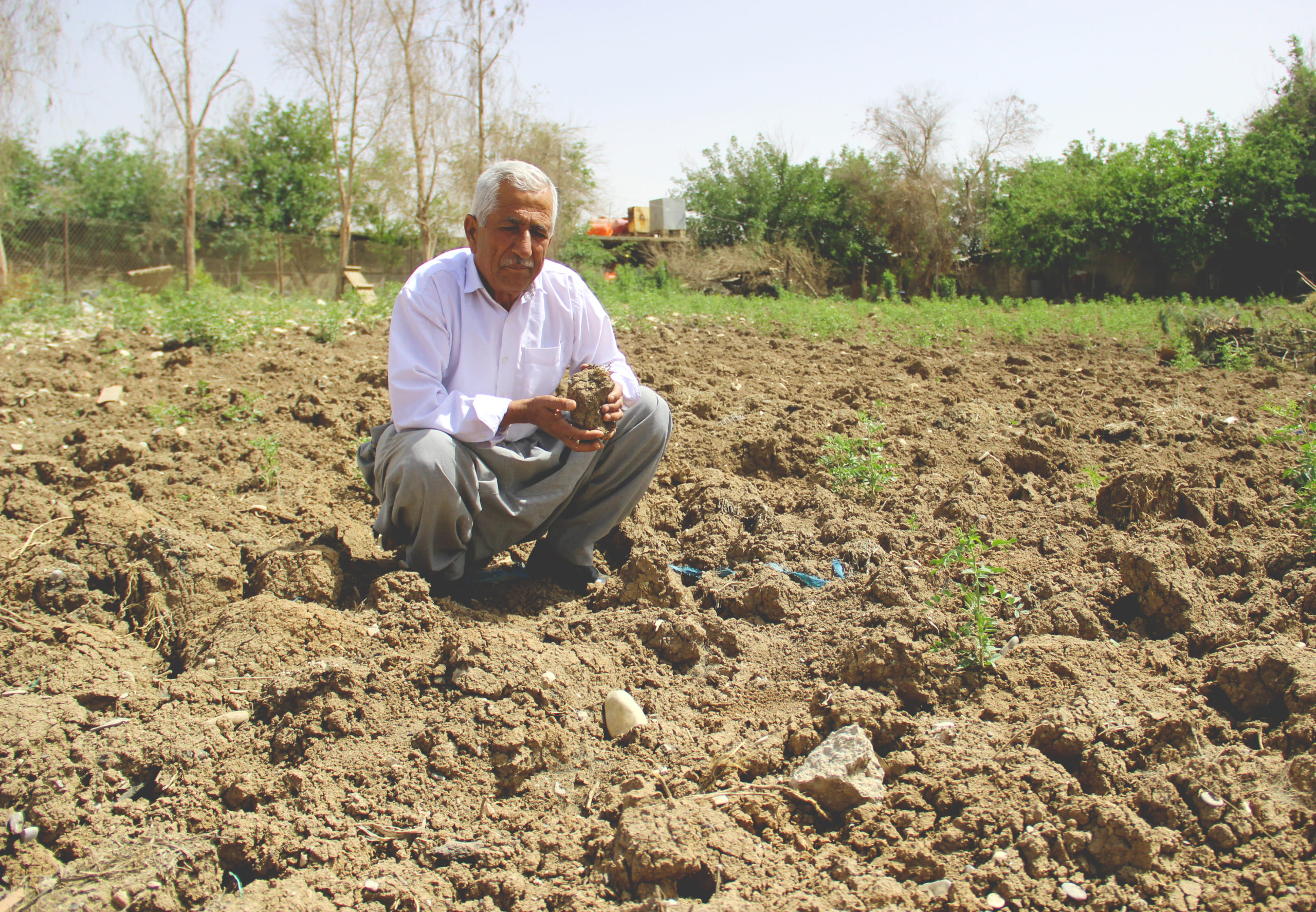
‘Never Sure When We Have Water’
Back in the day, 65-year-old Taha Ali Karim used to grow and market several products, such as tomatoes, cucumbers, courgettes and aubergines. From the beginning of 2000, he saw his yield decreasing until it stopped bearing its fruit. “Before then, we were mainly relying on rainwater, and especially on Tanjaro River which once had clean water to irrigate the land,” said the 65-year-old, dressed in a white shirt and light-gray baggy pants. “We also had two or three springs.” Now, the river is polluted and the springs have dried up.
Today, he shares his well with two more families, carefully monitoring water volumes and making sure there’s enough for all of them.
“We can’t sell what we produce any more,” he said. “We’ve lost our passion to do farming since we’re not seeing an outcome.”
Karim, who also acts as a village representative, reported contamination of Tanjaro River, water scarcity and economic backlash against reduced food production are some of the residents’ major concerns. His formal written complaints have been met with little to no cooperation. Karim warned 80 percent of water wells in Chaqlawa will run dry in the future. The only solution he sees is for one large reservoir, around 200 meters deep. He requested several times that governorate authorities look into it, but hasn’t received any answer.
“We feel abandoned in many ways, starting with the fact that we can’t access clean water,” he reiterated, estimating the daily water supply at two-and-a-half hours for each well. “Because we depend on our water wells, we can never be sure when we have water and when we don’t.”
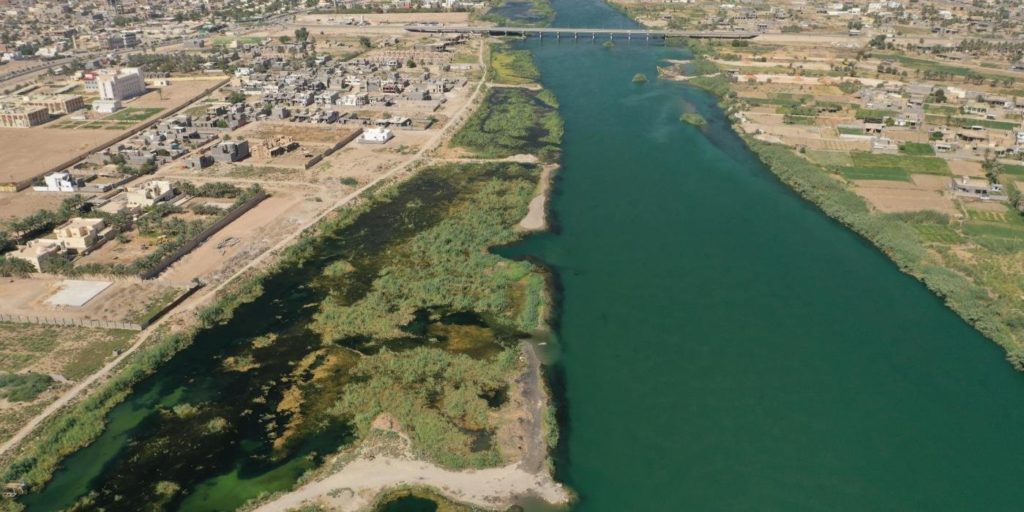
‘Our Wells Are Drying Up Fast’
At about 15 minutes away from the hamlet, in Naw Grdan—a village made up of 370 houses totaling some 1,800 inhabitants—Mohamed Tofiq, 54, in an all-black outfit with a waist band wrapped around the top of his pants, waved a hand from afar welcoming this reporter to enter his home.
“It’s been really damaging,” the cattle breeder told Toward Freedom. “There’s very little rain, we have no springs, our wells are drying up fast.”
Although he has three water wells, they are located on his farmland. That is far from where he lives, making collecting water a tedious task.
The majority of residents either draw clean water from wells or buy potable water. For non-drinking purposes, some may even purchase trucks of water from Tanjaro River despite it being unsafe.
The effect of water scarcity on stockbreeding has been drastic, given how much water they consume.
“Since we’ve been having less and less rainfall, I sometimes have to take my farm animals 3 to 4 kilometers outside the village to find greener pastures for grazing,” the 54-year-old noted.
“Before I had 120 cows, I was selling 10 every month and buying another five right away because I could easily re-sell beef cattle to butcher shops,” Tofiq said. “Now, I have 60 baby cows, and sell five or six in a month.”
He explained that, with the increased expenses involved in animal feeding, it is not worth investing into the production of dairies. That is especially because of recent greater reliance on imports. He just keeps a cow to produce milk, cheese and yogurt for his family.
The cow breeder also indicated that cultivation of wheat and barley—the only crops grown in the village—has dropped in the last couple of years. Now, less than a quarter of the population grow them.
Tofiq, whom Naw Grdan community members tapped as an unofficial representative, pointed out the main problem villagers encounter is the government’s lack of planning for the agriculture sector. That includes ensuring efficient water management and a fair provision of water resources, as well as supporting farmers by different means, such as with machinery, tools, fertilizers and financial incentives.
One proposal he put forward to the governorate was to create a big water reservoir to sustain the villagers, after a team of geologists found last year large groundwater reserves in Naw Grdan. Alternatively, he suggested, the water supply network that serves greater Sulaymaniyah should be linked to the village.
Four New Dams
A combination of a semi-arid climate, drought conditions, decline in rainfall, and decreasing water levels in the Euphrates and Tigris rivers arriving from upstream neighbors have compromised farmers’ ability to grow food in Iraq and in the Kurdish region.
According to a report published by the Norwegian Refugee Council (NRC) in August of last year, wheat production in the Kurdistan region is expected to decrease by half because of the drought. Further research the NRC released last December found more than one-third of wheat farmers in drought-affected regions of Iraq faced crop failure in 2021. This impacted average monthly income, which dropped below survival rates in six governorates, leaving one in five families without enough food.
The Iraqi Ministry of Agriculture announced at the beginning of July that desertification threatens more than 50 percent of Iraq’s available farmland. Water shortages and dry climate had already forced the Iraqi government last October to order farmers to cultivate only half of the arable land during the winter.
The Iraqi water resources ministry warned in April that the country’s water reserves had decreased by half since 2021. The same ministry anticipated in a report released towards the end of last year that, unless urgent action is taken to fight against declining water volumes, Iraq’s two main rivers will be entirely dry by 2040
Moreover, the World Bank forecast in November that Iraq could suffer a 20-percent drop in drinking water by 2050.
Rahim echoed some of the calls by Humat Dijlah and Waterkeepers Iraq-Kurdistan for the protection of waterways that include “efficient water use” through advocacy to government officials and public awareness, prevention and removal of dams, and “serious steps from the government” to negotiate with Iran and Turkey and demand Iraq’s share of water. He maintained that the Iraqi central government and the KRG need to cooperate on water security issues.
The water campaigner slammed the KRG’s plan to build another four large dams as well as Turkey’s discussed building of the Cizre. “We already have two big dams in Kurdistan, they are not even half full,” he underlined. “We don’t need to see more dams built.”
Instead, he proposed, small reservoirs could be created in farmlands to manage water resources suitably around farming communities.
A staff person in charge of media relations at the KRG’s Ministry of Agriculture and Water Resources didn’t respond to written questions, despite initially welcoming them.
The Kurdish region is in the midst of a water crisis, some of which has been blamed on poor water management and lack of funds. Diar Gharib Latif, head of the Sulaymaniyah governorate’s Directorate of Environment, acknowledged that, stressing the need for a “serious management system” to protect water resources and to mobilize “necessary capital” for it.
He also emphasized wastewater treatment should be introduced to stop waterways from being contaminated, with high pollution loads advancing through the KRI down to Iraq’s southern governorate of Basra, one of the most polluted cities in Iraq. With water reserves dwindling, water quality deterioration additionally reduces available supplies.
“We have faced drought for two years now. At our directorate, we are pushing for a decree law in the Kurdistan parliament that aims to protect water resources qualitatively and quantitatively,” Latif told Toward Freedom. He added that the agriculture and irrigation committee within parliament would be tasked with further discussing finding solutions to water shortages and budgeting for a plan.
“We wish to receive the needed funds so that we can respond to the drought and other water-related issues in a scientific way and with good strategy planning,” he alluded to the ongoing budget disputes between the federal government in Baghdad and the semi-autonomous KRG.
Expressing concern for the suffering of the agricultural sector in the KRI, the local official anticipated that, if the drought drags on for another year, not only it will be a devastating blow to agriculture and food security overall, but the environmental impact will be severe, too.
He insisted that Iraq should have effective water negotiations with its neighbors and finalize an agreement. To date, there is no international treaty for the Euphrates-Tigris basin, leaving Iraq exposed to unilateral alterations of water flows by Turkey and Iran.
KRG’s authorities allocated 21 billion Iraqi dinars (roughly $14 million) to maintain the water distribution network in the Kurdish regional capital of Erbil ahead of the summer season. Regional officials said they were digging more than 130 new wells to stem water scarcity, though that could also negatively impact the performance of pre-existing wells.
In an attempt to diminish the effects of the drought, the KRG ministry signed in March a memorandum of understanding with Power China to build four dams in Erbil, Sulaymaniyah and Duhok.
At the Second International Water Conference in Baghdad held last March, Iraq’s ministries of water resources and of the environment signed new cooperation agreements to support a joint approach to tackling the water problem. International and Iraqi NGOs demanded that these and other relevant agreements and policies be effectively funded and implemented, including the 2009 Law on Protection and Improvement of the Environment and the 2001 Law on Conservation of Water Resources, both of which prohibit the dumping of waste and discharge of pollutants in public waters.
In the meantime, the situation remains dire for Iraq’s farmers.
“We expect the harvest to be really bad,” Hussein said. “Most crops will die since we have far from enough water to survive the summer heat.”
Alessandra Bajec is a freelance journalist specializing in West Asia and North Africa. Between 2010 and 2011, she lived in Palestine. Then she was based in Cairo from 2013 to 2017. Since 2018, Bajec has lived in Tunis.

